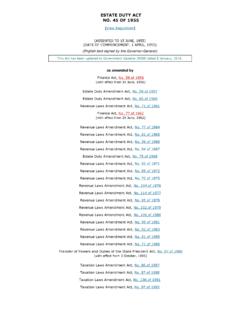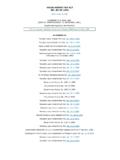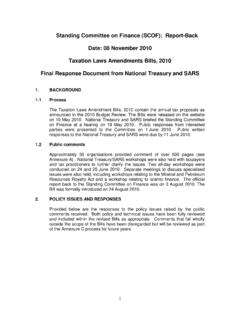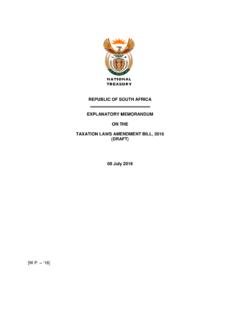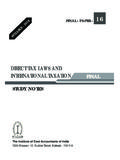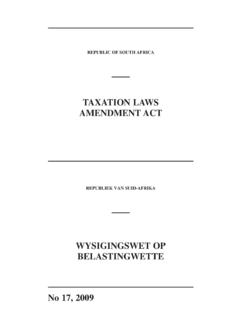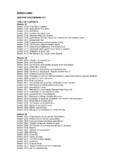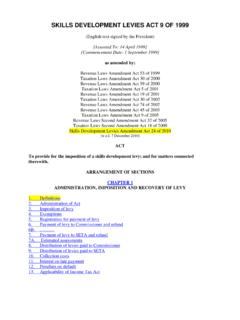Transcription of Amendment of Estate Duty Act 45 of 1955 and The …
1 21 January 2016. _____. Amendment of Estate Duty Act 45 of 1955 and The Use of Retirement Annuities in Estate Planning _____. A popular Estate planning tool in the past was to transfer discretionary funds of a client to a retirement annuity and then to switch the retirement annuity to a living annuity. By doing this the client's Estate was reduced by the amount invested in the retirement fund and Estate duty tax was saved upon the client's death. This potential Estate duty tax benefit that was achieved on the lump sum that was transferred to the retirement annuity, must be reconsidered after the recent Amendment of the Estate Duty Act. The explanatory notes on the Amendment to the Estate duty act from the Fiduciary Institute of South Africa is noted below.
2 In an increasingly complex legal and economic environment, financial intermediaries should tread carefully when giving Estate planning advice to their clients. Estate planning is a highly technical area and we can assist with advice that has a client's best interests at heart. Kind regards, Servo Fiduciary Services (Pty) Ltd EXPLANITORY NOTE RECEIVED FROM THE FIDUCIARY INSTITUTE OF SOUTH AFRICA. Amendment of Estate Duty Act 45 of 1955. (2) Property means any right in or to property, movable or immovable, corporeal or incorporeal, and includes - (a) any fiduciary, usufructuary or other like interest in property (including a right to an annuity charged upon property) held by the deceased immediately prior to his death.
3 (b) any right to an annuity (other than a right to an annuity charged upon any property) enjoyed by the deceased immediately prior to his death which accrued to some other person on the death of the deceased, (bA) so much of the amount of any contribution made by the deceased in consequence of membership or past membership of any pension fund, provident fund, or retirement annuity fund, as was not allowed as a deduction in terms of section 11(k) or (n) of the Income Tax Act, 1962 (Act No. 58 of 1962), or paragraph 2 of the Second Schedule to that Act or, as was not exempt in terms of section 10C of that Act in determining the taxable income as defined in section 1 of that Act, of the deceased.
4 [Paragraph (bA) inserted by section 2 of taxation laws Amendment Act 25 of 2015 with effect from 1 January 2016 and applies in respect of the Estate of a person who dies on or after that date in respect of contributions made on or after 1 March 2016. This change is clearly aimed at putting a stop to a scheme that resulted from a 2008 change to the Estate Duty Act, 45 of 1955. Prior to that, all lump sums from retirement funds payable upon death were property deemed to be property of the deceased under section 3(3)(a)bis of the act and as such potentially dutiable in the Estate of the deceased, while annuities paid by any retirement fund were exempt from Estate duty by section 3(3)(a)bis(i).]
5 With effect from 1 January 2009 section 3(3)(a)bis was abolished, leading to all benefits from retirement funds payable upon the death of the deceased to be free from Estate duty. This resulted in some abuse of this benefit, with some financial advisers advising their elderly, wealthy clients to make large single premium investments in retirement annuities (RA) to decrease the value of their estates. There are anecdotes about amounts as large as R50m being invested in a single premium RA. As a result of the income tax treatment of non-deductible contributions to retirement funds, these large investments would then pay income tax free and Estate duty free to the dependants and beneficiaries of the deceased investor after his/her death.
6 (See the provisions of section 11(k) and (n) and the Second Schedule to the Income Tax Act, 58 of 1962, as well as section 10C of the same act.). Due to the insertion of this new section 3(2)(bA) into the Estate Duty Act, any contribution amount to a retirement fund that was not income tax deductible in the year it was made will now be property in the deceased Estate of the member of such fund upon the member's death. Therefore such amounts will henceforth potentially be dutiable in the Estate of such member, depending on the size of the net Estate (including these amounts). This will be for all deaths occurring on or after 1 January 2016, and for all non-deductible contributions to retirement funds made on or after 1 March 2015.
7 Any lump sum from a retirement fund upon death could now, in effect, be totally exempt from duty (if no non-deductible contributions to the fund were made after 1 March 2015), potentially dutiable in part (if the lump sum amount exceeds the amount of the non-deductible contributions made after 1 March 2015), or potentially dutiable in total (if the non-deductible contributions made after 1 March 2015 exceed the lump sum amount). Please note that whether a lump sum is taken upon death, or if so, the size of the lump sum taken, has no bearing on the amount included in property under this new section it is the amount of non-deductible contributions made after 1 March 2015 that is included as property in the deceased Estate for purposes of determining the gross Estate in the Estate duty calculation.
